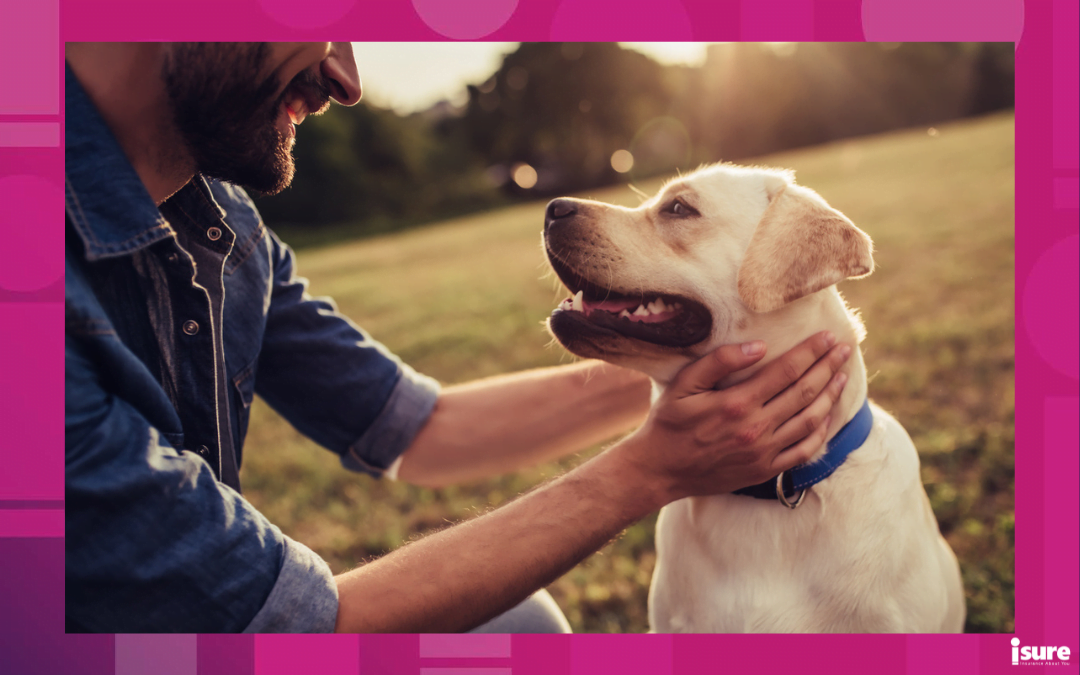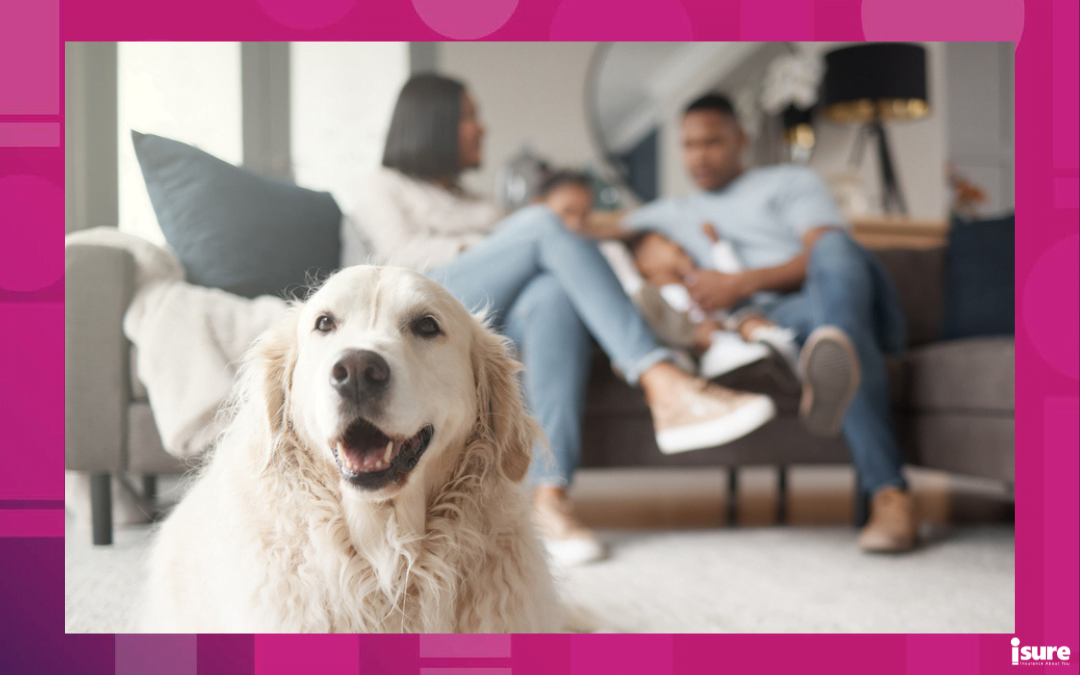Dog owners see their animals as part of the family. However, to your insurer, pets are considered property and may represent a liability risk. Insurance is probably the last thing you might think of when you bring a new furry friend into your home. However, it’s your job to keep them safe and offer them companionship. Nevertheless, they can pose a danger to your visitors or violate local bylaws. So, when you’re buying those new pet supplies, remember to think about insurance coverage. Let’s learn more about how dogs can affect your insurance rates.
Dogs and car insurance
While owning a fur baby won’t directly increase your car insurance rate, having a “crowding driver’s seat” traffic conviction can. It’s not unusual to see a dog’s head or nose sticking out of the rear window of a passing car. But, if you drive with your pet on your lap, you can face a hefty fine and even demerit points, which may lead to an auto insurance increase. According to OPP Sergeant Kerry Schmidt, “there is no specific charge for a dog in your lap,” but, he writes in an email, “the likely potential charge can be ‘crowding [the] driver’s seat.’”
In Ontario, the Highway Traffic Act states: “No person shall drive a motor vehicle with persons or property in the front or driver’s seat so placed as to interfere with the proper management or control of the motor vehicle.” However, if your pet is interfering with the safe control of your vehicle, you may be charged with “crowding the driver’s seat” under Section 162 HTA and/or “careless driving” under section 130 HTA. If a collision resulting in serious injury or death occurs, criminal charges can apply.
Possible penalties for ‘crowding’ the driver
If convicted, you can receive three demerit points on your driving record, plus an $85 fine and an additional $25 in fees, including a victim surcharge and court costs. If found guilty of crowding the driver’s seat in a community safety zone, the fine can increase to $120, plus fees. In one case, the OPP Central Region issued a Caledon driver a $110 traffic ticket and three demerit points for driving with a poodle-mix on their lap.
When you receive any traffic ticket, you have 15 days to dispute the charge. If you do not, you will likely get a conviction for the violation, which can increase your auto insurance rate upon renewal, depending on the severity of the traffic conviction(s).
Dogs and home insurance
While you have opened you home to your pet, you may not realize how your dog can impact your home insurance. As previously stated, your insurer views your dog as your property, which means they expose you to potential liability and risk. Any injuries or damage your dog may cause are your responsibility.
Ontario Dog Owner’s Liability Act
Very few people know that Ontario has an act called the Ontario Dog Owner’s Liability Act. It essentially states that as a dog owner, you are liable for any medical bills, pain, suffering, loss of income, or property damage the acts of your dog may have caused. Therefore, it’s important to contact your isure broker so we can ensure you dog is covered.
Does home insurance cover dog bites?
Home insurance providers assess the risk associated with all aspects of your property, including your furry friend. By adopting a dog, you increase the risk your insurer takes when providing you with coverage because of the possibility of your dog biting someone. In North America, 4.5 million people suffer dog bites each year, with about 900,000 of these requiring medical treatment. Even the most well-trained dog can act unexpectedly if they are forced into an uncomfortable situation. Luckily, that’s where your home insurance provider will step in and cover the costs for you, so long as you are covered.
Liability Coverage
Third-party liability insurance is an important part of your home insurance. If there is a chance that your pet can pose a threat to people in your home, or surrounding it, then you may find you have an increased rate, need to purchase higher liability coverage, or even be denied insurance all together. Like with any accident that happens on your property, if your dog causes damages or injures someone, you are considered liable.
Your home insurance provider should know if you have a dog or any other pet. Some cover them under your home policy, some may not. This is because your furry friend may present a liability exposure. You may be liable if your pet is found responsible for harming another person. You’ll then be legally obligated to compensate the victim in some way. The good news is, most homeowners insurance policies cover dog bites as part of liability coverage. So, whether it’s an injury bill or the bill for damaged possessions, your insurer is likely to swoop in and save the day.
While you might think it’s not important to advise your insurance broker that you own a dog, think about this…the Humane Society of Canada estimates that someone suffers a dog bite every 60 seconds in Canada. That’s a staggering statistic!
Not all dogs are equal
Letting your home insurance provider know you are thinking of getting a dog is the first step towards ensuring adequate coverage. Learning how dogs may affect your insurance is important when it comes to adequate coverage. However, your provider may ask you about the breed when calculating your home insurance quote. In fact, you may need to pay a higher rate for your home insurance if you have a particular dog breed, or they may refuse coverage all together. This is because certain dog breeds are more frequently involved in lawsuits than others, and therefore may not be covered.
High-risk dog breeds
Each insurance provider has different requirements for which dog breeds homeowners can have and still keep their home insurance. Some breeds are typically considered more high-risk than others:
- Pitbulls
- Rottweilers
- Mixed breeds that have Rottweiler or Pitbull in them
- Dobermans
- Siberian Huskies
- German Shepherds
- Staffordshire Bull Terriers
- American Staffordshire Terriers
- Dogs with past aggressive behaviour
While some insurance companies won’t cover homes with certain types of dogs, others will offer you a policy, but insist you buy additional liability coverage.
According to a study from the Applied Animal Behaviour Science Journal, large dogs aren’t any more likely to bite than small ones. Siberian Huskies, Greyhounds, Pitbulls and even Rottweilers were all marked as fairly calm dogs. Meanwhile, the two of the tiniest breeds, Dachshund and Chihuahua, scored as the more aggressive dogs.
How to help prevent dog bites
For the most part, the behaviour of your pet is little to do with its breed, and is more to do with how we raise them and the situation they are in. Try to socialize your pet, treat them with love and respect, and not force them into a situation where it feels the need to defend itself. The Ontario SPCA and Humane Society has these safety guidelines:
- Babies and children must be supervised around dogs at all times, and children should be taught how to play with dogs gently and approach them correctly.
- Teach kids to be safe around dogs and treat all animals with respect.
- Do not tease, chase, or yell at a dog.
- Do not crowd or corner a dog so they do not feel defensive.
- Do not approach unattended dogs.
- Do not take food away from a dog or pick up dropped food and stay away from their bowls and toys.
- If a dog gets too excited or becomes aggressive, stand still with your arms folded inwards and avoid eye contact. The dog will lose interest and walk away.
- Approach dogs calmly and from a slight angle while avoiding eye contact. If you are greeting a small dog or one who is lying down, crouch sideways instead of standing over them. Let dogs smell your hand by extending it to them in a fist.
- Pet dogs on the chest or the side of the neck, but not over the head.
- Take a dog training class when you adopt a dog, especially if they’ve experienced trauma.
What happens if my insurer doesn’t allow my pet coverage?
Having a dog is a huge responsibility. They are, after all, a family member that requires care and attention. But you do need to be protected if someone is injured by your dog, in any circumstance. As more Canadians adopt dogs, it’s important to let your isure broker know so you are not opening yourself up to a potential lawsuit down the line. As a dog owner, if you are not 100% certain that you are covered for dog bites or injuries, you should contact your insurer immediately to find out. If they won’t offer you coverage for your dog, you may want to consider comparing home insurance quotes to find an insurer who will. Contact your isure representative to learn more about how dogs may affect your insurance. We can help you find home insurance that works for you and your best furry friend!




